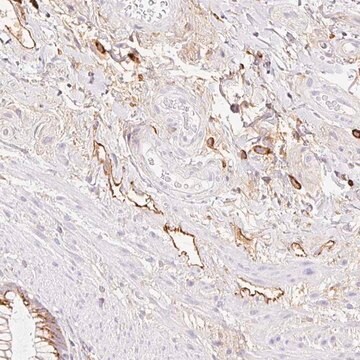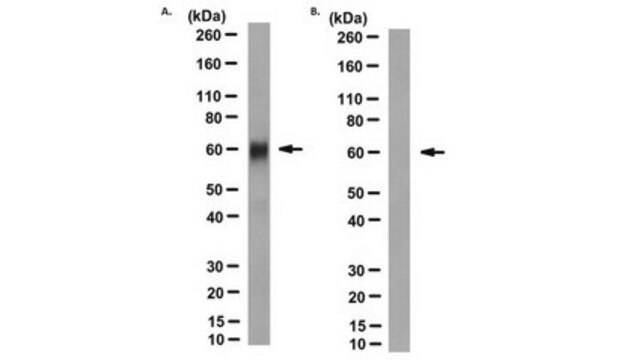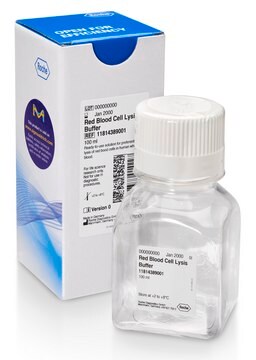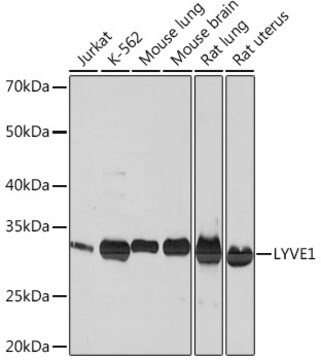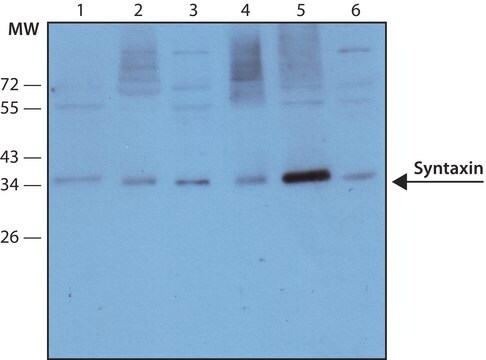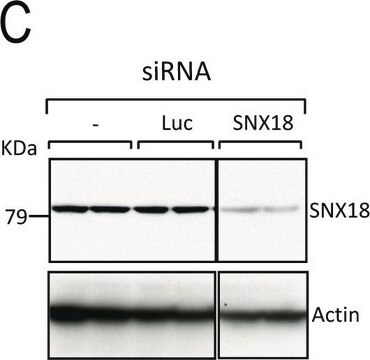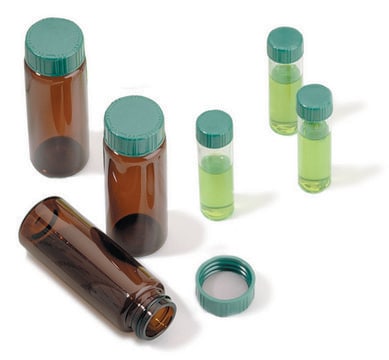SAB4300606
Anti-LYVE1 antibody produced in rabbit
affinity isolated antibody
同義詞:
Anti-CRSBP-1 antibody produced in rabbit, Anti-HAR antibody produced in rabbit, Anti-LYVE-1 antibody produced in rabbit, Anti-XLKD1 antibody produced in rabbit, Anti-lymphatic vessel endothelial hyaluronan receptor 1 antibody produced in rabbit
登入查看組織和合約定價
全部照片(1)
About This Item
分類程式碼代碼:
12352203
NACRES:
NA.41
推薦產品
生物源
rabbit
共軛
unconjugated
抗體表格
affinity isolated antibody
抗體產品種類
primary antibodies
無性繁殖
polyclonal
形狀
buffered aqueous solution
分子量
~40 kDa
物種活性
mouse, human, rat
濃度
1 mg/mL
技術
western blot: 1:500-1:1000
同型
IgG
免疫原序列
(K-N-Q-Q-K)
NCBI登錄號
UniProt登錄號
運輸包裝
wet ice
儲存溫度
−20°C
目標翻譯後修改
unmodified
基因資訊
human ... LYVE1(10894)
一般說明
LYVE-1 (lymphatic vessel endothelial hyaluronan receptor 1) is a type I integral membrane polypeptide. It is present on lymph vessel endothelial cells of both normal and neoplastic tissues. LYVE consists of a single N-terminal HA binding domain. It is mapped to human chromosome 11p15.
Lymphatic vessel endothelial hyaluronan receptor 1 (LYVE1), also known as CRSBP, is encoded by the gene localized on human chromosome 11p15.4. The encoded protein is mainly mapped to the plasma membrane as well as intracellular fibrillar structures in lymphatic endothelial cells (LECs), including primary human dermal LECs and SVEC4-10 cells. LYVE1 belongs to the link module superfamily of C-type lectins.
免疫原
Peptide sequence around aa. 271-275 (K-N-Q-Q-K), according to the protein LYVE1.
生化/生理作用
LYVE-1 (lymphatic vessel endothelial hyaluronan receptor 1) plays an important role in hyaluronan homeostasis. It controls cellular trafficking of the lymph nodes. It serves as an important lymphatic vessel marker.
Lymphatic vessel endothelial hyaluronan receptor 1 (LYVE1) induces activation of its ligand, platelet-derived growth factor (PDGF), vascular endothelial growth factor (VEGF)-A and hyaluronic acid, opens lymphatic intercellular junctions in vitro and in vivo by enhancing contraction of lymphatic endothelial cells (LECs). The encoded protein also facilitates uptake of hyaluronan (HA) and trafficking of leukocytes to draining lymph nodes.
特點和優勢
Evaluate our antibodies with complete peace of mind. If the antibody does not perform in your application, we will issue a full credit or replacement antibody. Learn more.
標靶描述
Ligand-specific transporter trafficking between intracellular organelles (TGN) and the plasma membrane. Plays a role in autocrine regulation of cell growth mediated by growth regulators containing cell surface retention sequence binding (CRS). May act as an hyaluronan (HA) transporter, either mediating its uptake for catabolism within lymphatic endothelial cells themselves, or its transport into the lumen of afferent lymphatic vessels for subsequent re-uptake and degradation in lymph nodes.
外觀
Solution in phosphate-buffered saline containing 0.02% sodium azide and 50% glycerol
免責聲明
Unless otherwise stated in our catalog or other company documentation accompanying the product(s), our products are intended for research use only and are not to be used for any other purpose, which includes but is not limited to, unauthorized commercial uses, in vitro diagnostic uses, ex vivo or in vivo therapeutic uses or any type of consumption or application to humans or animals.
未找到適合的產品?
試用我們的產品選擇工具.
儲存類別代碼
10 - Combustible liquids
水污染物質分類(WGK)
WGK 1
閃點(°F)
Not applicable
閃點(°C)
Not applicable
分析證明 (COA)
輸入產品批次/批號來搜索 分析證明 (COA)。在產品’s標籤上找到批次和批號,寫有 ‘Lot’或‘Batch’.。
High LYVE-1-positive lymphatic vessel numbers are associated with poor outcome in breast cancer
Bono P, et al.
Clinical Cancer Research, 10(21), 7144-7149 (2004)
Homodimerization of the Lymph Vessel Endothelial Receptor LYVE-1 through a Redox-labile Disulfide Is Critical for Hyaluronan Binding in Lymphatic Endothelium
Banerji S, et al.
The Journal of Biological Chemistry, 291(48), 25004-25018 (2016)
LYVE-1, a new homologue of the CD44 glycoprotein, is a lymph-specific receptor for hyaluronan
Banerji S, et al.
The Journal of Cell Biology, 144(4), 789-801 (1999)
Identification of a three-gene expression signature of poor-prognosis breast carcinoma
Bieche I, et al.
Molecular Cancer, 3(1), 37-37 (2004)
Romain Parent et al.
Biochemical and biophysical research communications, 450(1), 7-12 (2014-05-24)
The endothelium lines blood and lymph vessels and protects underlying tissues against external agents such as viruses, bacteria and parasites. Yet, microbes and particularly viruses have developed sophisticated ways to bypass the endothelium in order to gain access to inner
我們的科學家團隊在所有研究領域都有豐富的經驗,包括生命科學、材料科學、化學合成、色譜、分析等.
聯絡技術服務

